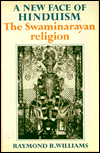

 |

|

The average rating for A New Face of Hinduism: The Swaminarayan Religion based on 2 reviews is 3.5 stars.
Review # 1 was written on 2020-04-28 00:00:00 Tina Terry Tina TerryI found this book in the second hand shop across from the British Museum. I read it a few months ago, and I’m afraid my memories of it are already a bit hazy. This book is a series of lectures De Groot, a Sinologist and former missionary, gave in America as part of a series looking at world religions. I had rather low expectations for this book. De Groot was writing in 1912 and most works written at this time tend to have a very low and often confused opinion on Chinese religion. However, this book pleasantly surprised me. De Groot previously wrote a series of books on Chinese religion and rites, these books are based on the (questionable in my opinion) idea that Chinese religion is simply animistic in outlook. However, the series contains a lot of first hand information and Qing sources that are unavailable elsewhere. De Groot gives his own translation as well as the original Chinese, and references where he is quoting. They contain wonderful stories of ghosts and supernatural. This book didn’t contain nearly as many nice stories but rather focused on the philosophy, religious practices and beliefs. What was remarkable for the time was the equal attention given to Taoism and Confucianism. At this time Taoism was largely ignored as the superstitions of the ignorant and given very little serious attention by Westerners. However, De Groot does a decent job of linking together Taoist and Confucian beliefs. He looks briefly at the influence of Buddhism on Chinese belief, but mostly is concerned with the two indigenous systems of belief, which he claims are really the same. De Groot first looks at the unifying nature of the Tao as the nature of the universe and then as the Tao of man. He looks at the virtues associated with Confucianism, and then looks at the history of the search for immortality. He goes on to look at not just the religion of the Emperor and the elite but also of the people, he discusses Filial piety, the creation of the Taoist church, exorcism, magic, and the religious duty of the Emperor. The fact that he doesn’t limit himself to “high” or “low” religion, but looks at all religion equally helps him to see the unifying principals behind them. He ends the book with a look at Feng Shui, relating the principles that he has noted in the study of religion to the workings of geomancy. While I would caution people to not take everything in this book as accurate, it is still quite interesting and a very enjoyable read. |
Review # 2 was written on 2012-10-31 00:00:00 Fred Landgraf Fred LandgrafIt's been a while since I read Barton's book but here is what I remember. Barton goes to great lengths to prove that the foundations of the government of the United States of American was established by men who wished for this country to be a Christian nation. Indeed, he goes so far as to quote out of context, misinterpret the intent of the founding fathers and early courts and in his attempts to make the founders look like angels, occasionally succeeds in making them look like idiots. Barton clearly is utterly biased and has an agenda which does not include establishing fact but rather, making the world safe for Christianity (as opposed to, Safe for Freedom). My opinion, of course! --Wag-- |
CAN'T FIND WHAT YOU'RE LOOKING FOR? CLICK HERE!!!